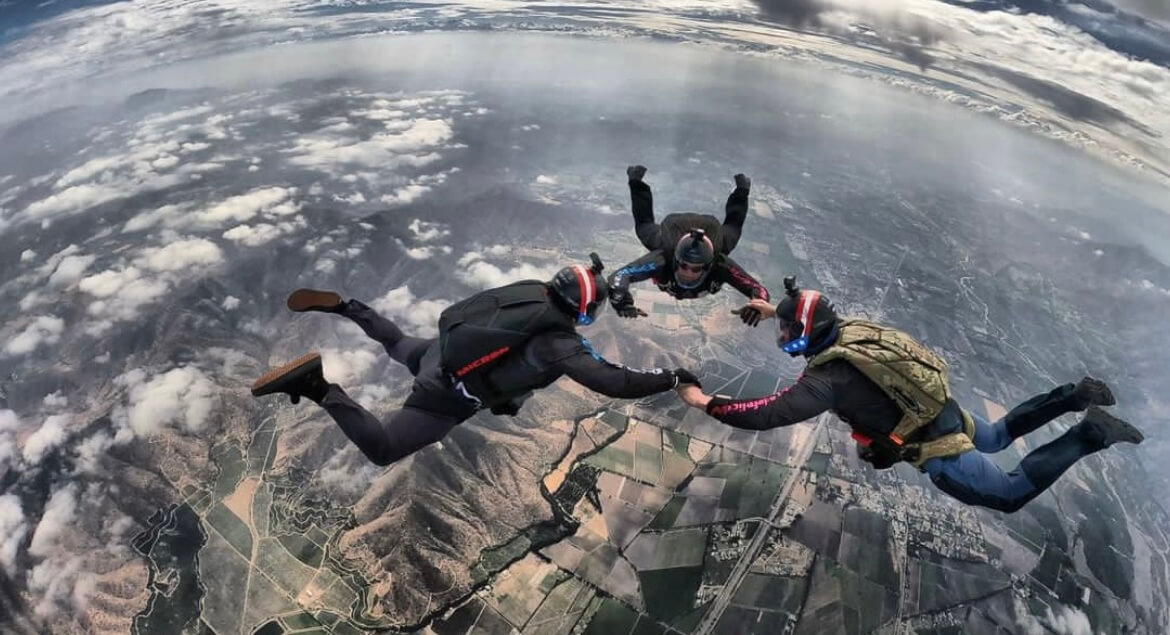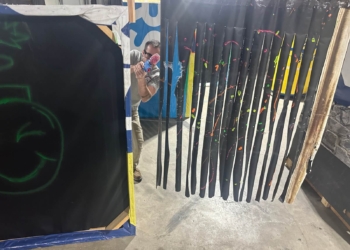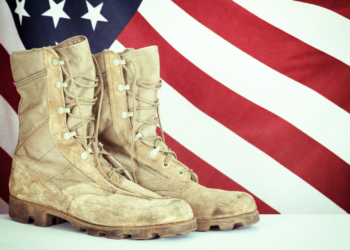 Editor’s note: This article was originally published prior to the Triple 7 expedition setting the world record. It has since been updated.
Editor’s note: This article was originally published prior to the Triple 7 expedition setting the world record. It has since been updated.
A group of special operations veterans have set a world record as part of a skydiving expedition focused on raising millions for military spouses and children.
Legacy Expeditions, a veteran-owned extreme sports company, kicked off the “Triple 7” expedition this month. Ten skydivers from across the special forces community ― including a Canadian ― jumped together first in Antarctica, then finished six days later in Tampa, Florida, having skydived on every continent. The countdown clock was set for 168 hours.
With its success, the group now holds the world record for skydives on every continent in the shortest amount of time. The money raised will be funneled through Folds of Honor, a veteran charity focusing on scholarships for spouses and children of fallen warriors. Triple 7 members are hoping to hit enough funds raised for at least 1,400 of those scholarships.
“We use our expeditions to tell the stories of our fallen, to keep their stories alive, to share all those attributes and principles and traits those people had,” said retired Navy SEAL Mike Sarraille, the founder and CEO of Legacy. “If we can raise some money for Folds of Honor, if we can jump in memory of our fallen and their stories get broadcast, that’s a win.”
The skydivers are not just aiming to break world records while raising money for a good cause ― they will be helping future spec ops of teams of tomorrow, too.
Legacy is partnered with WHOOP, an advanced fitness and health data tracking company. Every skydiver will be wearing a WHOOP device on their wrists during the entirety of the expedition, monitoring 70 metrics like heartrate variability in high-stress situations, skin temperature, respiratory rate and oxygen saturation levels.
“What we’ll be able to gather is a really interesting data set,” said Kristin Holmes, WHOOP’s VP of Performance. “Hopefully we can transfer it to other high-stress environments, including in the special forces community.”
Despite the fact that every skydiver is experienced ― the team lead, a former Navy SEAL named Fred Williams, “stopped counting after 15,000 jumps,” he said. Still, the seasoned professionals expect the expedition to be a high-stress environment due to the number of moving parts of the plan. For example, flights, which they have booked commercially, could be delayed or canceled. Jet lag and off-kilter circadian rhythms from crossing so many time zones will kick in. Weather, especially in extremely volatile Antarctica, can eat up precious time.
WHOOP will be measuring every skydiver’s response to all of it. Dr. Kirk Parsley, a former SEAL and the expedition’s physician, said that the information collected could be beneficial for the entire military. He will specifically be looking at how fluctuating hormone levels and sleep deprivation interact and affect processing time, cognition levels, pain threshold and perceived exertion.
“These things can improve readiness performance and resilience,” he said. “If you can prevent from breaking people in the military, you don’t have to fix them.”
The Triple 7 team will be traveling not only with the skydivers, expedition doctors and support staff, but also a film crew. Dan Myrick, the director of 1999’s The Blair Witch Project, is crafting a documentary focusing on the expedition. The film is set to hopefully be released in summer of 2023.
“I don’t want this documentary to just be about the skydiving,” Myrick said. “Yeah, that’s awesome, but I really want to tell the stories of the men who are doing all of this, and why.”
Myrick and his crew have already had time to study and watch the Triple 7 team. The men have been practicing for months, most recently at a skydiving facility owned by Williams near Coolidge, Arizona. By its end, Sarraille said, the skydivers will have completed 900 jumps together in preparation.
A Marine veteran repeatedly chauffeured the skydivers up, with the benches inside the plane quickly emptying each time. Speed, after all, will be a crucial factor for this record attempt. The faster they perform the dives, the quicker they can hit the road in search of the next continent.
“From a physiological standpoint, skydiving is almost like a walk in the park for these guys,” said Dr. Gabrielle Lyon, a member of the expedition’s medical and research team who regularly takes of care spec ops troops and their families. “Even so, the rigors they have faced, like combat, are a very high adrenaline state. And the stress these guys might feel, that has the potential for those who are well-trained to allow for focus rather than be debilitating.”
Sarraille is certainly hoping for focus to be a hallmark on his team’s January trip. Focus on the “cool factor” of the record, yes ― but most importantly, focusing on the men and women who perished in the Global War on Terror, as well as their families left behind.
“Special operations has a mindset. We used to say, when people told us something can’t be done, we have a way of making the seemingly impossible, possible,” he said. “When you’re in the military, it’s a tribe; it’s homecoming and belonging. Those are bonds that can never be broken.”



































